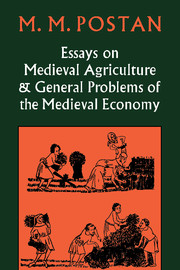Book contents
- Frontmatter
- Preface
- Acknowledgements
- Contents
- I GENERAL
- 1 The economical foundations of medieval economy
- 2 The rise of a money economy
- 3 The fifteenth century
- 4 Some social consequences of the Hundred Years War
- 5 The costs of the Hundred Years War
- 6 Why was science backward in the Middle Ages?
- II AGRARIAN
- Index
- Plate section
1 - The economical foundations of medieval economy
Published online by Cambridge University Press: 05 November 2011
- Frontmatter
- Preface
- Acknowledgements
- Contents
- I GENERAL
- 1 The economical foundations of medieval economy
- 2 The rise of a money economy
- 3 The fifteenth century
- 4 Some social consequences of the Hundred Years War
- 5 The costs of the Hundred Years War
- 6 Why was science backward in the Middle Ages?
- II AGRARIAN
- Index
- Plate section
Summary
The subject is the economic base of medieval society. Thus entitled it carries with it a certain early-marxist implication. Yet its conventional meaning is fairly clear – population and land settlement, technique of production and the general trends of economic activity: in short, all those economic facts which can be discussed without concentrating on the working of legal and social institutions and upon relations of class to class.
These topics will be treated in what follows as a single theme. To have to separate them from other phenomena more obviously institutional and social, indeed to separate them from the whole flow of history, is bad enough. But to separate population from settlement, settlement from technique, and all the three from the general trend of prices and production would be a crippling act of mutilation. I therefore propose to deal with these topics more or less in combination.
What makes it necessary and possible to deal with this group of subjects together and yet apart from other topics of medieval history is that they have all been recently drawn into the discussion of general trends of economic activity, or, to use a more fashionable term, into the ‘long-term movements’ of social income. Historians need no reminding that the main debate in the last ten to twelve years has been concerned with the direction and speed of economic evolution in the Middle Ages.
- Type
- Chapter
- Information
- Publisher: Cambridge University PressPrint publication year: 1973
- 4
- Cited by



